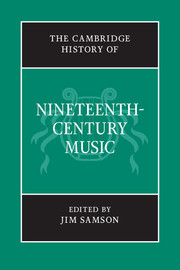Book contents
- Frontmatter
- Part One 1800–1850
- 1 The musical work and nineteenth-century history
- 2 Music And the rise of aesthetics
- 3 The profession of music
- 4 The opera industry
- 5 The construction of Beethoven
- 6 Music and the poetic
- 7 The invention of tradition
- 8 Choral music
- 9 The consumption of music
- 10 The great composer
- Part Two 1850–1900
- Chronology
- Institutions
- Personalia
- Index
- References
9 - The consumption of music
from Part One - 1800–1850
Published online by Cambridge University Press: 28 March 2008
- Frontmatter
- Part One 1800–1850
- 1 The musical work and nineteenth-century history
- 2 Music And the rise of aesthetics
- 3 The profession of music
- 4 The opera industry
- 5 The construction of Beethoven
- 6 Music and the poetic
- 7 The invention of tradition
- 8 Choral music
- 9 The consumption of music
- 10 The great composer
- Part Two 1850–1900
- Chronology
- Institutions
- Personalia
- Index
- References
Summary
Social background
For most Europeans and North Americans at the beginning of the nineteenth century, the legacy of the French and the Industrial Revolutions was a social and economic transformation which saw the virtual destruction of one social class, the peasantry, and the hegemony of a newer one, the bourgeoisie. In the ensuing ‘age of capital’ the rise of the bourgeoisie and its relationship with the nobility is as complex as it is important, and a degree of generalisation must be forgiven in what is a musical, rather than a social, history. The pace and the precise nature of this transformation differed from region to region; this chapter, however, is concerned only with the principal areas of Europe in which it is evident: Great Britain, France and the German-speaking lands. And although the bourgeoisie was by no means exclusively citified, my focus will be London, Paris and Vienna, as it is in these, the major European capitals of the early nineteenth century, that the developments can be seen at their most concentrated.
Because Britain had had her political revolution at an earlier date, the power of the monarchy posed no great threat, and, for the most part, little inconvenience. Nor did the rise of the bourgeoisie significantly challenge the nobility, since new industrial capital soon formed the main component in national capital, overtaking landed inheritance, and leaving the latter safe in the hands of its hereditary owners for their own posterity. This also meant that surplus aristocratic capital could be invested in new and exciting ventures such as the railways which had the advantage of being not only British, but on home ground, as opposed to some of the more distant foreign ventures, where the volatility of local conditions could, and often did, jeopardise investments; the loss of the American states was a sobering lesson, in terms of national imperial pride as well as of economics.
- Type
- Chapter
- Information
- The Cambridge History of Nineteenth-Century Music , pp. 237 - 258Publisher: Cambridge University PressPrint publication year: 2001
References
- 1
- Cited by

